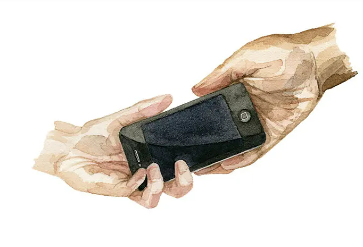By Ellen Xu, age 16, Del Norte High School, San Diego

I stare at the texts on my phone screen, sent from Dad an ocean away: “Love you.” “Miss you.” “Call?” When I was young, I used to play a game where I would repeat a word enough times for it to sound foreign. Now, I’m playing the same game but in reverse, attempting to remember what it was like when his texts still held their meaning.
Out of habit, I type out “Lub”— my way of saying “love”— and press send, a fraction of a second too late before I see the letters rearrange themselves on their own accord. “Lin.” My mom’s name. Not again. I’m convinced autocorrect has a mind of its own; or, maybe it knows that there is a part of me that has a hard time letting go, that wants to revert to a time when her name was not taboo when sent to him.
Dad moved to China the summer after sixth grade. I remember the long nights we would sit at kitchen table discussions, a tug of war between “job” and “family.” Whenever I look back, I’m reminded of the movie “Interstellar”; not just because it was our favorite movie, but because if I had only been smart enough like Murphy, I would have told him to stay. It was not long after he left that distance severed the bond between my parents, like the expanding universe pulling stars out of orbit. Like Cooper pounding his fist on an interdimensional bookshelf, I am banging on the keyboard hoping the right words will fall out. But all that ends up on the other side is empty text and autocorrect.
I write “Lub” again, this time removing the autocorrect and appending a gauche apology. He texts back: “Call for just one minute?” I think of all the things I want to say: It’s not the same to call. It’s been two years since I was last with you. I just had my first driving lesson today and don’t you remember promising me years ago that you would be the one to teach me to drive? Do you know how many memories we’ve traded for texts and calls?
But I don’t say this. I bite back the frustration and text back “OK,” and in the next instant, his face lights up my screen.
We don’t say much in that minute. He doesn’t ask me how I am, because “good” is never a good enough answer. I don’t ask about his new life, his job, his family, or any of the questions I used to hurl at him. His tear-filled smile, creased with hope and sadness, makes me swallow all the things I want to say. The fact that he is OK with this, that he would keep calling and texting me every night even if I never answered, that just being able to see me on the other side of the screen is enough, makes it enough for me to let go. To move past my anger and regret at how, when I needed it the most, my words came out jumbled in those crucial moments at the kitchen table, where I could have changed things.
I’m not angry anymore. He looks at me and tells me he loves me. And for once, my words come out just as I want them to: no longer autocorrecting to the bitterness of a past left behind.
“I lub you, too.”